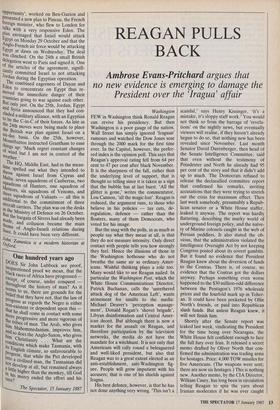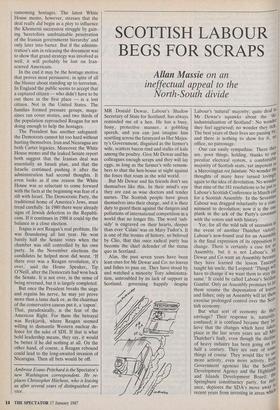REAGAN PULLS BACK
Ambrose Evans-Pritchard argues that
no new evidence is emerging to damage the President over the Iragua' affair
Washington FEW in Washington think Ronald Reagan can revive his presidency. But then Washington is a poor gauge of the nation. Wall Street has simply ignored `Iraguan' rumours and watched the Dow Jones soar through the 2000 mark for the first time ever. In the Capitol, however, the prefer- red index is the opinion poll. This says that Reagan's approval rating fell from 64 per cent to 47 per cent after black November. It is the sharpness of the fall, rather than the underlying level of support, that is thought so telling since it is taken as a sign that the bubble has at last burst. 'All the glitter is gone,' writes the commentator, Lou Cannon, 'all the magic lost'. Reagan is reduced, the argument runs, to those who believe in his policies — tax cuts, de- regulation, defence — rather than the floaters, many of them Democrats, who voted for his image.
But the snag with the polls, in as much as people say what they mean at all, is that they do not measure intensity. Only direct contact with people tells you how strongly they feel. Hence the illusions of those in the Washington hothouse who do not breathe the same air as ordinary Amer- icans. Wishful thinking plays a role too. Many would like to see Reagan nailed. In particular the Washington Post, which the White House Communications Director, Patrick Buchanan, calls the `untethered attack dog of the American Left', wants atonement for insults to the media: Michael Deaver's 'perception manage- ment', Donald Regan's 'shovel brigade', Libyan disinformation and Central Amer- ican deceit. But although there is now a market for the assault on Reagan, and therefore participation by the television networks, the media do not have the mandate for a witchhunt. It is not only that Americans will rally round a beleaguered and well-liked president, but also that Reagan was to a great extent elected as an anti-establishment, anti-Washington fig- ure. People will grow impatient with his accusers; that is one of his shields against Iragua.
His best defence, however, is that he has not done anything very wrong. 'This isn't a scandal,' says Henry Kissinger, 'it's a mistake, it's sloppy staff work.' You would not think so from the barrage of 'revela- tions' on the nightly news, but eventually viewers will realise, if they haven't already begun to do so, that nothing new has been revealed since November. Last month Senator David Durenberger, then head of the Senate Intelligence Committee, said that even without the testimony of Poindexter and North he already had 95 per cent of the story and that it didn't add up to much. The Democrats refused to release the declassified committee report that confirmed his remarks, inviting accusations that they were trying to stretch out the crisis for maximum effect. Then last week somebody, presumably a Repub- lican senator or a White House staffer, leaked it anyway. The report was hardly flattering, describing the murky world of underground foreign policy, and the naive- ty of Marine colonels caught in the web of Persian peddlers. It also stated the ob- vious, that the administration violated the Intelligence Oversight Act by not keeping Congress posted about its covert gambits. But it found no evidence that President Reagan knew about the diversion of funds to the Contras. There is, of course, no evidence that the Contras got the dollars anyway. Perhaps something even worse happened to the $30 million-odd difference between the Pentagon's 1976 wholesale prices and the fourfold mark up in Teher- an. It could have been pocketed by 011ie North's friends, or paid into Republican slush funds. But unless Reagan knew, it will not finish him.
Shortly after the Senate report was leaked last week, vindicating the President for the time being over Nicaragua, the White House felt confident enough to face the full fury over Iran. It released a secret memo drafted by Oliver North that con- firmed the administration was trading arms for hostages. Price: 4,000 TOW missiles for five Americans. (The weapons were sent; there are now six hostages.) This is nothing new. Another memo, by the CIA Director, William Casey, has long been in circulation telling Reagan to spin the yarn about Iranian moderates if he was ever caught ransoming hostages. The latest White House memo, however, stresses that the deal really did begin as a ploy to influence the Khomeini succession struggle by gain- ing 'heretofore unobtainable penetration of the Iranian governmernt hierarchy' and only later into barter. But if the adminis- tration's aim in releasing the document was to show that grand strategy was involved as well, it will probably be lost on Iran- scarred Americans.
In the end it may be the hostage motive that proves most persuasive, in spite of all the bluster about standing up to terrorism. In England the public seems to accept that a captured citizen — who didn't have to be out there in the first place — is a lost citizen. Not in the United States. The families formed pressure groups, maga- zines ran cover stories, and two thirds of the population reproached Reagan for not doing enough to help the hostages.
The President has another safeguard: the Democrats cannot hit too hard without hurting themselves. Iran and Nicaragua are both Carter legacies. Moreover the White House memo and the leaked Senate report both suggest that the Iranian deal was essentially an Israeli plan, and that the Israelis continued pushing it after the administration had second thoughts. It even looks as if one reason the White House was so reluctant to come forward with the facts at the beginning was fear of a rift with Israel. The Democratic Party, the traditional home of America's Jews, must tread carefully. In 1980 there were already signs of Jewish defection to the Republi- cans. If it continues in 1988 it could tip the balance in a close election.
Iragua is not Reagan's real problem. He was floundering all last year. He won barely half the Senate votes when the chamber was still controlled by his own party. In the November elections the candidates he helped most did worst. 'If there ever was a Reagan revolution, it's over,' said the House Speaker, Tip O'Neill, after the Democrats had won back the Senate. It is not over, in the sense of being reversed, but it is largely completed.
But once the President breaks the siege and regains his nerve, he may yet prove more than a lame duck or, as the chairman of the conservative caucus put it, a 'capon'. That, paradoxically, is the fear of the American Right. For them the betrayal was Reykjavik, where Reagan seemed willing to dismantle Western nuclear de- fence for the sake of SDI. If that is what bold leadership means, they say, it would be better if he did nothing at all. On the other hand, of course, a Reagan rebound could lead to the long-awaited invasion of Nicaragua. Then all bets would be off.
Ambrose Evans-Pritchard is the Spectator's new Washington correspondent. He re- places Christopher Hitchens, who is leaving us after several years of distinguished ser- vice.











































 Previous page
Previous page